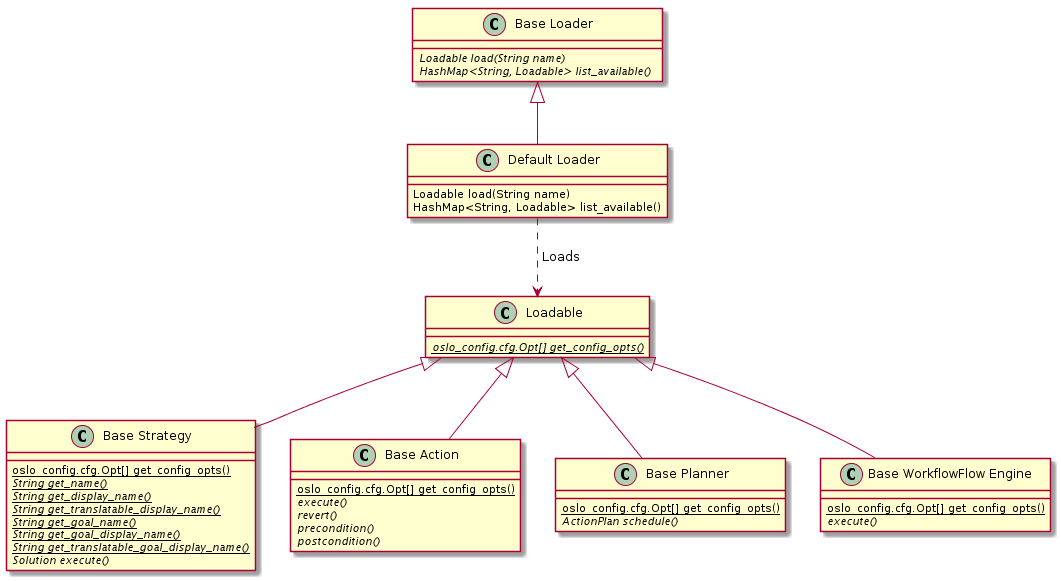Allow the developer of a Watcher plugin to add specific parameters¶
https://blueprints.launchpad.net/watcher/+spec/plugins-parameters
In Watcher, it is possible to deploy and configure new strategies, actions, planners, etc. and associate each “plugin” to a Python class, without having to redeploy a new version of Watcher.
However, it should be possible to pass some extra parameters depending of the configuration of the OpenStack cluster or some behaviour (e.g. timeout, weights, etc.) on which Watcher is operating.
This is the reason why, we should give the possibility to the developer to add some parameters depending on the configuration of OpenStack cluster on the plugins.
Problem description¶
As of now, all plugins that a developer implements are loaded as plain old Python classes before being instantiated. Hence, this means that Watcher does not pass down anything more than hardcoded parameters. So if a developer currently wants to define a set of configuration options specific to its own plugin, he/she would have to manually declare them. This way of doing things causes the following problems:
No standard way of declaring configuration options increases the difficulty for an administrator to configure Watcher:
The generated configuration file would miss out these parameters which will further increase the configuration complexity.
How to find where these parameters are without looking at the code?
Every plugin developer has to code the same logic declare and fetch these options.
Hence, Watcher should provide a way to ease the process of declaring and fetching extra options depending on the configuration of the OpenStack cluster or some behaviour (e.g. timeout, weights, workers, etc.) on which Watcher is operating whilst keeping things simple from an administrator viewpoint.
This is the reason why we should provide to the developer a standard way to both declare and fetch configuration options so that whenever the administrator generates the Watcher configuration sample file, it contains the configuration options of the plugins that are currently available.
Use Cases¶
As a developer, I want to be able to specify a set of configuration options for my plugin So that I can allow an administrator to adapt/tune the behaviour of my plugin given the configuration of an OpenStack cluster.
As an administrator, I want to be able to access and modify the configuration options of all available plugins So that I can adapt/tune their behaviour the requirements of my OpenStack cluster.
As an administrator, I want to be able to generate a configuration file that includes the options provided by each available plugin So that I can understand how to use each one of them without having to look at the codebase.
Project Priority¶
Not relevant because Watcher is not in the big tent so far.
Proposed change¶
Here below is the class diagram outlining the changes that will have to be made in order to support the addition of configuration options:

Moreover, all plugins are currently instantiated by the DefaultLoader when
its load() is being called. This method should be improved so it also fetch
the configuration provided by the plugin using the get_config_opts()
abstract class method that every plugin class should implement. The latter
method needs to be an class method so that when Watcher will collect the
configuration of each plugin, there will be no need to instantiate them.

In order to expose these plugin parameters to the administrator, we also have
to auto-discover them when we use the configuration file generator which is
triggered either during the generation of the Watcher documentation or manually
with the tox -e config command:

In order to be able to achieve the process described in the above sequence diagram, here below is a recap of the changes that will have to be made:
Make each plugin provide a class method named
get_config_opts()that will define all its configuration options.Update the
list_opts()function so that it also collects the configuration options from all the available plugins so that generating the configuration file via thetox -e configcommand includes them in its configuration sample file.
The administrator would then have adapt this configuration sample file to the requirements of any given OpenStack cluster.
Alternatives¶
Instead of using a Loadable abstract class, we do it by convention.
Indeed, the main solution relies on a Loadable abstract base class that
defines the get_config_opts() method. But instead, we could use the duck
typing to say that by convention, every plugin should implement a
get_config_opts() without having to enforce it codewise.
This alternative would mean less code but would also be more error-prone for
the plugin developer.
Data model impact¶
None
REST API impact¶
None
Security impact¶
None
Notifications impact¶
None
Other end user impact¶
None
Performance Impact¶
None
Other deployer impact¶
New configuration sections and options will be added to the Watcher configuration file. Hence, the administrator should be aware of them. This also mean that the documentation should be updated to encourage the plugin developer to provide a detailed description of every single configuration option that gets declared.
Developer impact¶
None
Implementation¶
Assignee(s)¶
- Primary assignee:
vincent-francoise
- Other contributors:
david-tardivel
Work Items¶
Implement the
Loadableabstract classAdd an abstract class method named
get_config_opts()with should return a list ofoslo_config.cfg.Optinstances.
Make the following classes inherit from
Loadableabstract class:BaseStrategyBaseActionBasePlannerBaseWorkflowFlowEngine
For each of the above, provide a default implementation of
get_config_opts()that returns an empty list which should be the default behaviour.Enhance the
load()method of theDefaultLoaderclass to now also load the configuration options that relates to the plugin we want to load and inject them into the loaded plugin upon instantiating it.
Dependencies¶
Testing¶
Add needed unit tests to cover the new functionality introduced by this blueprint
Update the broken unit tests
Documentation Impact¶
Update all plugin implementation documentations to now mention that
configuration options can be specified via the get_config_opts() method.
References¶
None
History¶
None
